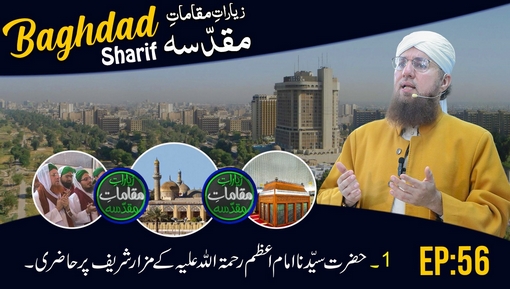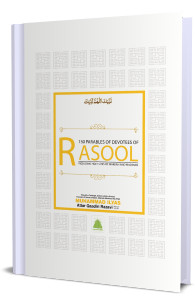
Before the declaration of prophethood by the last Messenger of Allah عَزَّوَجَلَّ the Prophet Muhammad صَلَّى اللّٰهُ عَلَيْهِ وَاٰلِهٖ وَسَلَّم, a mother with her eight year-old son was travelling to her maternal family across the Arabian desert. Suddenly, a gang of muggers attacked and plundered all their belongings and made off with the child. After mugging, the robbers offered this child up for sale at Makkah’s famous market ‘Ukkaz’. On the other side, [in Makkah] Sayyidatuna Khadija-tul-Kubra رَضِیَ اللّٰهُ عَنْهَا said to her nephew, Hakeem Bin Hizam رَضِىَ اللّٰهُ عَـنْهُ: ‘Bring me an Arab-born wise slave’. Sayyiduna Hakeem Bin Hizam رَضِىَ اللّٰهُ عَـنْهُ saw this child in the market, he bought it and presented it to his aunt. When the Nikah of Sayyidatuna Khadija-tul-Kubra رَضِیَ اللّٰهُ عَنْهَا was performed with the Holy Prophet صَلَّى اللّٰهُ عَلَيْهِ وَاٰلِهٖ وَسَلَّم, the heart of the Compassionate Prophet صَلَّى اللّٰهُ عَلَيْهِ وَاٰلِهٖ وَسَلَّم was touched by the child’s qualities; his manners and habits were so earnest that when he asked for this slave from Sayyidatuna Khadija-tul-Kubra رَضِیَ اللّٰهُ عَنْهَا, she presented it as a gift to his blessed court (Tafseer Durr-e-Mansoor, vol. 6, pp. 563; Part 22, Ahzaab, Taht-al-Ayah 5; Tabaqat-e-Ibn-e-Sa’d, vol. 3, pp. 29 to 31)
Dear Islamic brothers! The slave that came under the slavery of the Holy Rasool صَلَّى اللّٰهُ عَلَيْهِ وَاٰلِهٖ وَسَلَّم and was brought up with his affections and love is known by the name of Sayyiduna Zaid Bin Harisah رَضِىَ اللّٰهُ عَـنْهُ.
Showing no preference to father
A few tribesmen of Sayyiduna Zaid رَضِىَ اللّٰهُ عَـنْهُ came to Makkah for Hajj. They recognized him by chance and informed his father that his son was living in slavery. The father accompanied his brother immediately arrived at Makkah, taking an amount of ransom to free his son from slavery. The Beloved Masterصَلَّى اللّٰهُ عَلَيْهِ وَاٰلِهٖ وَسَلَّم said: ‘Ask Zayd if he wants to go with you, take him without a ransom, and if he doesn’t want to go, then leave him‘. When Sayyiduna Zaid رَضِىَ اللّٰهُ عَـنْهُ was asked, he replied: ‘Who would I prefer than Allah’s Messenger صَلَّى اللّٰهُ عَلَيْهِ وَاٰلِهٖ وَسَلَّم? For me, you are my mother, father and uncle’s place’. The father and uncle said: ‘O Zaid! ‘Do you love slavery?’ Sayyiduna Zaid رَضِىَ اللّٰهُ عَـنْهُ replied: ‘I will never leave the company of this great entity high in dignity’. Seeing the extraordinary love and affection of Sayyiduna Zaid رَضِىَ اللّٰهُ عَـنْهُ, the Beloved Master صَلَّى اللّٰهُ عَلَيْهِ وَاٰلِهٖ وَسَلَّم freed him and said: ‘Zayd is my son’. Seeing these honours and blessings on Sayyiduna Zaid رَضِىَ اللّٰهُ عَـنْهُ, his father and uncle rejoiced and returned with contentment. (Ibid)
Attribute to the father
The blessed Companions رَضِیَ اللّٰهُ تَعَالٰی عَنْهُم used to call Sayyiduna Zaid رَضِىَ اللّٰهُ عَـنْهُ in the beginning as ‘Zaid Bin Muhammad’, but when the verse number 5 of Surah Ahzaab اُدْعُوْهُمْ لِاٰبَآىٕهِمْ هُوَ اَقْسَطُ عِنْدَ اللّٰهِۚ- (Kanz-ul-Iman, translation of Quran: Call them (i.e. adopted children) with their (biological) father’s names; this is more justified according to Allah;) was revealed, they started to call him ‘Zaid Bin Harisah’. (Muslim, pp. 1014, Hadees 6262)[1]
Virtues and Excellence
Sayyiduna Zaid Bin Harisah رَضِىَ اللّٰهُ عَـنْهُ reminds us one of the brightest moons in the sky of excellence with his grandeur which will never be eclipsed. He attained the highest rank in loyalty, a fondness for Jihad, taste of worship, humility and meekness. He supported the Prophet صَلَّى اللّٰهُ عَلَيْهِ وَاٰلِهٖ وَسَلَّم from tender age till his Shahadat. He was first amongst the freed slaves who were honoured with the wealth of true faith. (Seerat-e-Ibn-e-Hishaam, pp. 99) He is the only blessed companion whose name is mentioned in Quran. (Part 22, Surah Al-Ahzaab, Ayah 37) He got the title of ‘Hib-bun-Nabi’ [حِبُّ النَّبِی] i.e. ‘Dearest to the Prophet’ among the companions (Tahzeeb-ul-Asma, vol. 1, pp. 198) His name was announced to convey the news of the victory of Ghazwah-e-Badr in 2 AH to Madinah (Tabaqat Ibn-e-Sa’d, vol. 2, pp. 13) When the Holy Prophet صَلَّى اللّٰهُ عَلَيْهِ وَاٰلِهٖ وَسَلَّم left for Ghazwah-e-Bani Mustaliq on 2nd Sha’ban, 5 AH, he made him his deputy in Madinah. (Dalail-un-Nubuwwah, vol. 4, pp. 45) On 7 or 9 occasions, the Prophet صَلَّى اللّٰهُ عَلَيْهِ وَاٰلِهٖ وَسَلَّم sent him as the commander of armed forces, and every time he raised the flag of success. (Tabaqat Ibn-e-Sa’d, vol. 3, pp. 33)
Companionship in the travel to Taa’if
In the 10th year of the Prophethood in the month of Shawwal, the Messenger of Allah صَلَّى اللّٰهُ عَلَيْهِ وَاٰلِهٖ وَسَلَّم intended a trip to Taa’if. When the non-believers began to pelt the Beloved Prophet صَلَّى اللّٰهُ عَلَيْهِ وَاٰلِهٖ وَسَلَّم, with stones taunting him with abusive language along with clapping and mockeries, Sayyiduna Zaid رَضِىَ اللّٰهُ عَـنْهُ would take the pelting stones on his body thrown at his beloved Master صَلَّى اللّٰهُ عَلَيْهِ وَاٰلِهٖ وَسَلَّم and tried to save him till his head was wounded and he was bathed in blood too. (Subul-ul-Huda, vol. 2, pp. 438)
Gave horse in charity
When the blessed ayah
لَنْ تَنَالُوا الْبِرَّ حَتّٰى تُنْفِقُوْا مِمَّا تُحِبُّوْنَ ﱟ وَ مَا تُنْفِقُوْا مِنْ شَیْءٍ فَاِنَّ اللّٰهَ بِهٖ عَلِیْمٌ(۹۲)
You shall never attain righteousness until you spend the thing you love in the way of Allah, and Allah is Aware of whatever you spend.
[Kanz-ul-Iman (translation of Quran)] (Part 04, Surah Aal-Imran, Ayah 92)
was revealed, he said to the Prophet صَلَّى اللّٰهُ عَلَيْهِ وَاٰلِهٖ وَسَلَّم, ‘You know, among my assets, I love this horse the most! You may give it in charity. (Tareekh Ibn-e-Asakir, vol. 19, pp. 367)
Divine Help
Once, he رَضِىَ اللّٰهُ عَـنْهُ set off on a journey, a hypocrite accompanied him. Arriving at a ruin, the hypocrite said: ‘We should rest here’. Both of them entered and Sayyiduna Zaid رَضِىَ اللّٰهُ عَـنْهُ began to rest. Seeing this, the hypocrite tied him firmly with a rope and wanted to kill him. Sayyiduna Zaid asked him: ‘Why do you want to kill me?’ He said, ‘Because Muhammad صَلَّى اللّٰهُ عَلَيْهِ وَاٰلِهٖ وَسَلَّم loves you and I absolutely hate him.’, Sayyiduna Zaid immediately called O Allah [یارحمٰن! اَغِثْنِی], rescue me. Suddenly, the voice came in the ears of the hypocrite: ‘You’re doomed! Don’t kill him’. The hypocrite came out of the ruin but he didn’t find anyone. He wanted to kill again. The same voice came very close. The hypocrite looked around but no one was seen. He planned to kill the third time, the same voice was heard from very near, and the hypocrite came out. Suddenly an expert horseman appeared with a spear in his hand, he stabbed the spear into the hypocrite’s chest and he died in pain. The expert horseman entered the ruin and said to Sayyiduna Zaid رَضِىَ اللّٰهُ عَـنْهُ while untying his ropes: ‘Do you know me? I am Jibra’eel.’ (Tafseer Kabeer, vol. 1, pp. 154; summarised)
Reviled the Satan
In 8 AH, Jumadal Aula, when Ghazwah-e-Mautah took place, Sayyiduna Zaid Bin Harisah رَضِىَ اللّٰهُ عَـنْهُ was the standard bearer of the Islamic warriors. Satan approached him and filled his heart with the love of being alive, hatred of death and greed for the world, but he رَضِىَ اللّٰهُ عَـنْهُ said: ‘This is the time for strengthening Iman in the hearts of believers and the Satan is luring me to this world.’ (Tareekh Ibn-e-Asakir, vol. 19, pp. 368)
Martyrdom
In this battle, Muslims were 3000 in number, whereas, Roman soldiers were 100,000. He رَضِىَ اللّٰهُ عَـنْهُ invited the non-believers to Islam before the start of the battle. They responded with the attack from arrows and swords. After seeing this scene, he رَضِىَ اللّٰهُ عَـنْهُ got off from the horse and jumped into the battlefield on foot. Following him, the Muslims started fighting valiantly. The non-believers attacked and showered their lances and spears on him. He رَضِىَ اللّٰهُ عَـنْهُ embraced martyrdom while fighting with bravery. (Sharh Abi Dawood, vol. 6, pp. 41 to 42; summarised; Seerat-e-Mustafa, pp. 404)
May Allah عَزَّوَجَلَّ Have mercy upon him and bless us with forgiveness for his sake.
صلَّی اللہ علیہ واٰلہٖ وسلَّماٰمِیْن بِجَاہِ النَّبِیِّ الْاَمِیْن
[1] Ruling: This event and the Quranic ayah implies that it is not permissible for people who adopts someone’s child and write their name in place of the real father (of the adopted child, but the adopted child must be attributed to its real father. However, one who is adopting can register his name with the adopted child as a guardian, whereas the name of real father must be written with the adopted child.


















Comments